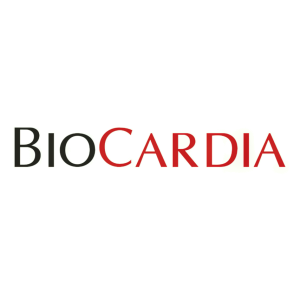BioCardia Announces Two Scientific Abstracts Have Been Accepted at the 2024 Technology and Heart Failure Therapeutics Conference
SUNNYVALE, Calif., Jan. 31, 2024 (GLOBE NEWSWIRE) -- BioCardia, Inc. (“BioCardia” or the “Company”) (Nasdaq: BCDA), a biotechnology company focused on advancing late-stage cell therapy interventions for cardiovascular disorders, is targeting heart failure and chronic myocardial ischemia as potential indications for its biotherapeutic candidates: autologous CardiAMP cell therapy and allogeneic CardiALLO cell therapy.
The Company announces that two scientific abstracts on its CardiAMP and its CardiALLO clinical stage therapeutic programs have been accepted for presentation at the Technology and Heart Failure Therapeutics Conference (THT) being held on March 4-6, 2024, in Boston, MA. Both abstracts will be presented in the Late-Breaking Clinical Science/First-In-Human & Early Feasibility Studies session on Monday March 4, 2024.
The first scientific abstract is entitled: “Interim Results from Adaptive Randomized Controlled Trial of Autologous Bone Marrow Mononuclear Cells Using the CardiAMP Cell Therapy System in Patients with Ischemic Heart Failure due to Reduced Left Ventricular Ejection Fraction (HFrEF).” The data to be presented are from the Company’s CardiAMP Phase 3 autologous cell therapy study, an international, randomized, double blind, controlled study that enrolled 125 patients with New York Heart Association Class II and III ischemic heart failure. The primary endpoint is the Finkelstein-Schoenfeld composite difference between groups based on all-cause heart death, major adverse cardiac and cerebrovascular events, and functional capacity as measured by six-minute walk distance. Dr. Amish Raval, Professor of Medicine at the University of Wisconsin at Madison is the lead author on the abstract.
As previously reported, the study showed benefits of reduced all-cause heart death equivalents and reduced major adverse cardiac events without safety concerns, but study was halted as it was not likely to meet its primary endpoint. This scientific presentation will provide detailed trial data including results supporting the design of the CardiAMP Heart Failure II Phase III Trial, recently approved by the FDA and soon to begin enrolling.
The second scientific abstract is entitled: “First in Man CardiALLO NK1R+ MSC Phase I/II Trial in Ischemic NYHA II and III HFrEF”. The data to be presented are from the Company’s CardiALLO Phase I/II allogeneic mesenchymal stem cell therapy study, which began enrollment in a 3+3 dose escalation design in December. The study is enrolling patients with New York Heart Association Class II and III ischemic heart failure, including those who were not eligible for the CardiAMP autologous cell therapy trial. Dr. Carl Pepine, Professor of Medicine at the University of Florida at Gainesville is the lead author on the abstract.
As previously reported, the CardiALLO Heart Failure study follows the Company’s earlier co-sponsored clinical studies of allogeneic mesenchymal stem cells for patients with ischemic heart failure of reduced ejection fraction. This scientific presentation will provide details on the early safety experience from this ongoing clinical study.
“BioCardia is pleased to share these analyses of its ongoing clinical autologous and allogeneic cell therapy studies at the THT Conference,” said Dr. Peter Altman, BioCardia Chief Executive Officer and President. “The positive results in these two development efforts as previously reported have included reduced mortality, enhanced heart function, and improved quality of life with no significant safety concerns with either of these cell therapy product candidates. Both cell therapy candidates are delivered with our proprietary minimally invasive Helix transendocardial biotherapeutic delivery system which is approved for use in Europe and approved for investigational use in the United States. Cell therapies with the unique profiles we are advancing in both the CardiAMP and CardiALLO programs have great promise as valuable therapeutics for the treatment of ischemic heart failure of reduced ejection fraction. We look forward to the presentations and discussions at the conference.”
About the CardiAMP Autologous Cell Therapy Program
CardiAMP Cell Therapy – FDA designated as a Breakthrough therapy – uses a patient’s own (autologous) bone marrow cells delivered to the heart in a minimally invasive, catheter-based procedure to potentially stimulate the body’s natural healing response. CardiAMP Cell Therapy incorporates three proprietary elements not previously utilized in investigational cardiac cell therapy: a pre-procedural cell analysis for patient selection, a high target dosage of cells, and a proprietary delivery system that has been shown to be safer than other intramyocardial delivery systems and exponentially more successful in cell retention. The CardiAMP HF trial is supported by the Maryland Stem Cell Research Fund and the Centers for Medicare and Medicaid Services. The proprietary CardiAMP cell procedure kits and their dedicated proprietary catheter delivery system are manufactured at BioCardia’s facility in Sunnyvale, California. CAUTION - Limited by United States law to investigational use.
About CardiALLO Allogeneic Cell Therapy Program
CardiALLO™ Allogeneic Cell Therapy provides an “off the shelf” mesenchymal stem cells (MSC) typically from a younger donor. These cells are immunomodulatory with potential for impact on inflammatory processes in heart failure and have been shown to release multiple critical angiogenic factors that can enhance microvascular function and capillary networks in ischemic tissues. The CardiALLO study is a dose escalation Phase I safety study to be followed by a Phase II randomized double-blind controlled study to assess therapeutic benefit or efficacy. The proprietary CardiALLO human cells and their dedicated proprietary catheter delivery system are manufactured at BioCardia’s facility in Sunnyvale, California. CAUTION - Limited by United States law to investigational use.
About BioCardia
BioCardia, Inc., headquartered in Sunnyvale, California, is developing cellular and cell-derived therapeutics for the treatment of cardiovascular and pulmonary disease. CardiAMP™ autologous and CardiALLO allogeneic cell therapies are the Company’s biotherapeutic platforms for the treatment of heart disease. BioCardia also acts as a biotherapeutic delivery partner supporting other cell, gene, and protein therapies for the treatment of heart failure, chronic myocardial ischemia and acute myocardial infarction. For more information visit: www.BioCardia.com.
Forward Looking Statements
This press release contains forward-looking statements that are subject to many risks and uncertainties. Forward-looking statements include, among other things, the presentation of abstracts at the THT conference, statements regarding our intentions, beliefs, projections, outlook, analyses or current expectations. Such risks and uncertainties include, among others, the inherent uncertainties associated with developing new products or technologies, regulatory approvals, unexpected expenditures, the ability to raise the additional funding needed to continue to pursue BioCardia’s business and product development plans, the ability to enter into licensing and partnering arrangements, and overall market conditions. These forward-looking statements are made as of the date of this press release, and BioCardia assumes no obligation to update the forward-looking statements.
We may use terms such as “believes,” “estimates,” “anticipates,” “expects,” “plans,” “intends,” “may,” “could,” “might,” “will,” “should,” “approximately” or other words that convey the uncertainty of future events or outcomes to identify these forward-looking statements. Although we believe that we have a reasonable basis for each forward-looking statement contained herein, we caution you that forward-looking statements are not guarantees of future performance and that our actual results may differ materially from the forward-looking statements contained in this press release. Factors that could cause or contribute to such differences include, but are not limited to, the Company’s liquidity position and its ability to raise additional funds, as well as the Company’s ability to successfully progress its clinical trials. As a result of these factors, we cannot assure you that the forward-looking statements in this press release will prove to be accurate. Additional factors that could materially affect actual results can be found in BioCardia’s Form 10-K filed with the Securities and Exchange Commission on March 29, 2023, under the caption titled “Risk Factors” and in its subsequently filed Quarterly Reports on Form 10-Q. BioCardia expressly disclaims any intent or obligation to update these forward-looking statements, except as required by law.








